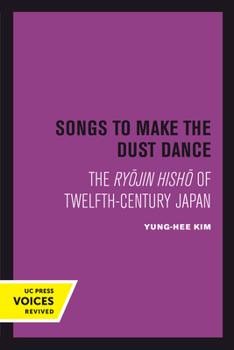Songs to Make the Dust Dance: The Ryojin Hisho of Twelfth-Century Japan
Select Format
Select Condition 
Book Overview
Breaking through the long-established image of Heian Japan (794-1185) as a culture dominated by ritualized aristocratic values, Yung-Hee Kim presents a picture of a country in transition, filled with a wide variety of common people responding to very ordinary situations. The court does not disappear, but rather becomes part of a larger society inhabited by Buddhist nuns and mountain ascetics, farmers and fishermen, beggars and gamblers. In popular...
Format:Paperback
Language:English
ISBN:0520303067
ISBN13:9780520303065
Release Date:August 2018
Publisher:University of California Press
Length:240 Pages
Weight:0.79 lbs.
Dimensions:0.6" x 6.0" x 9.0"
Customer Reviews
0 rating





